
page 73
Chapter II
Stories borrowed from Judaism
This division will prove to be the largest, partly, because these narratives, draped in the most marvellous garb of fiction, lived mostly in the mouth of the people; partly, because this fairy-tale form appealed to the poetic fancy of Muhammad, and suited the childish level of his contemporaries. In the case of the Old Testament narratives, which are seldom related soberly, but are for the most part embellished, it needs scarcely a question, or the most cursory enquiry, as to whether or not they have passed from the Jews to Muhammad; for the Christians, the only other possible source to which they could be attributed, bestowed very little attention in those days on the Old Testament, but in their narratives kept to what is strictly
Christian, viz., the events of the Life of Jesus, of His disciples and His followers, and of the multitude of subsequent Saints and wonder-workers, which afforded them abundant material for manifold embellishments. The Christians, for all that they accepted the Old Testament as a sacred writing, and although in those days no doubt had arisen as to whether or not they were to put the Old Testament on a level with the New in respect of holiness and divine inspiration, a doubt which has been brought forward for example by Scheiermacher in later times, - the Christians of that period, I say, had nevertheless a more lively interest in the New Testament, since it was the expression of their separation and independence. The Old Testament was common to them and the Jews, and indeed they could not deny to the latter a greater right of possession in it, for the Jews possessed it entirely, and were versed in it even to the minutest detail, an intimate knowledge with which we cannot credit the Christians. Further, just those points in the Old Testament which were specially suited to the Christian teaching are found to be scarcely touched upon in the Quran; thus, for instance, the narrative of the transgression of the first human pair is not at all represented as a fall into sin, involving the entire corruption of human nature which must afterwards be redeemed, but rather Muhammad contents himself with the plain, simple narration of the fact. This may be taken as an instance to prove that the narratives about persons mentioned in the Old Testament are almost all of Jewish origin, and this will he more clearly shewn when we come to details.
As we proceed to the enumeration of the individual borrowed stories, the necessity is forced upon us of arranging them in some order. We have no reason for arranging them according to their sources, (Bible, Mishna, Gemara, Midrash, etc.) as Muhammad did not gain his knowledge of these narratives from any of these sources, but was taught
them all verbally by those round him, and so they were all of the same value for him, and were all called biblical; furthermore we must pay no attention to their contents, for the narratives are not given as supporting any doctrines of Islam but are merely quoted as records of historical facts; and even in those cases where they are intended to set forth a doctrine, it is almost always either that of the unity of God, or that of the Resurrection of the dead. It appears therefore advisable to arrange them chronologically, by which means it will be most easy to recognise the numerous anachronisms among them. Either Muhammad did not know the history of the Jewish nation, which is very probable, or the narration of it did not suit his object, for only once is the whole history summed up in brief,1 and only the events in the lives of a few persons are mentioned. In this chronological arrangement we shall have to pay more attention to the personal importance of individuals than to any changes in the condition and circumstances of the nation, and thus in this arrangement we shall have the following Divisions: 1. Patriarchs; 2. Moses; 3. The three Kings who reigned over the individed Kingdom, viz., Saul, David & Solomon; and 4. Holy men who lived after them.
First Part.
Patriarchs: A. - From Adam to Noah.
The great event of the creation of the first man gave occasion for much poetical embellishment. Before the appearance of Adam, the jealousy of the angels, who had counselled against his creation, was roused, and God shamed them by endowing Adam more richly with knowledge than any of them. In the Quran we have the following description:2 "When thy Lord said unto the angels, 'I am

going to place a substitute on earth'; they said, 'Wilt thou place there one who will do evil therein and shed blood? but we celebrate thy praise and sanctify thee.' God answered 'Verily I know that which ye know not'; and He taught Adam the names of all things, and then proposed them to the angels, and said: 'Declare unto me the names of these things, if ye say truth.' They answered: 'Praise be unto thee, we have no knowledge but what thou teachest us, for thou art knowing and wise.' God said: 'O Adam, tell them their names;' and when he had told them their names, God said: 'Did I not tell you that I know the secrets of heaven and earth' and know that which ye discover, and that which ye conceal!'" The corresponding Hebrew passage may be thus translated:1 "When the Holy One, blessed be He! would create man, he took counsel with the angels, and said to them: 'We will make man in our image;'2 then they said: 'What is man that thou art mindful of him?3 What will be his peculiarity?' He said: 'His wisdom is greater than yours.' Then He brought beasts, cattle, and birds before them, and asked for their names, but they knew them not. But when He had

created man He caused the animals to pass before him and asked him for their names, and he replied: 'This is an ox, that an ass, this a horse and that a camel.' 'And what art thou called?' 'It is fitting that I should be called earthy, for I am formed of the earth.' And 'Thou art called LORD, for thou rulest all Thy creatures."3 From this arose the other legend1 that God, after the creation of man, commanded the angels to fall down before him, which they all did except Iblis,2 the devil. The legend bears unmistakeable marks of Christian development, in that Adam is represented in the beginning as the God-man, worthy of adoration, - which the Jews are far from asserting.3 It is true that in Jewish writings great honour is spoken of as shewn by the angels to Adam, but this never went so far as adoration; indeed when this was once about to take place in error, God frustrated the action. We find in Sanhedrin 29,4 "Adam sat in the Garden of Eden, and the angels roasted flesh for him, and prepared cooling wine"; and in another passage it is said,5 "After God had created man, the angels went astray in regard to him, and wanted to say before him,

O Holy one! then God permitted sleep to fall on him, and all knew that he was of earth." In favour of the Christian origin of this narrative we must count the fact that the name used by Christians for the devil is the one used in all the passages referred to instead of the general Hebrew name.1 From this event according to Muhammad arises the hatred of the Devil against the human race, because on their account he became accursed of God; and so his first work was to counsel man in the Garden of Eden2 to eat of the tree of knowledge.3 In this narrative the Devil is again given his Hebrew name,4 and yet the first explanation of the temptation through the snake as coming from the Devil seems to be entirely Christian, as no such reference is to be found in the older Jewish writings; the passage quoted below can only be regarded as a slight allusion:5 "From the beginning of the book tip to this point6 no Samech is to be found; as soon however as woman is created, Satan (with the initial letter Sin like Samech) is created also." Still we find in a book which, though forged, is undoubtedly old,7 the following statement:
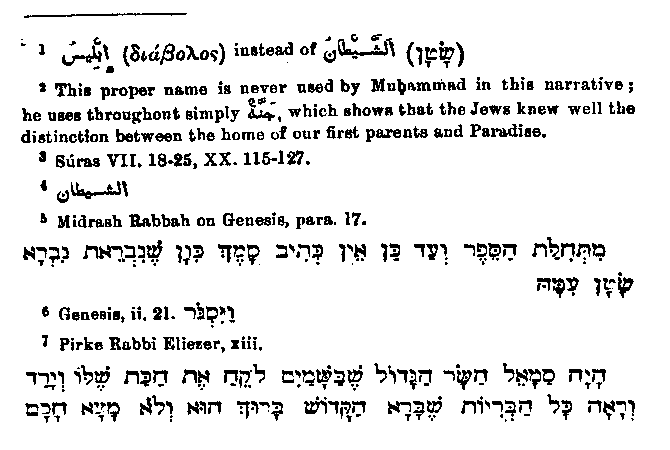
"Samael", the great prince in heaven, took his companions and went down and inspected all God's creatures; be found none more maliciously wise than the serpent, so he mounted it, and all that it said or did was at the instigation of Samael."1 This is legend, even if not entirely Jewish, appears to have been derived by Muhammad from the Jews. In the details of this narrative some confusion is found between the tree of knowledge and the tree of life. The former only is mentioned in Scripture as prohibited by God,2 and to the eating of that alone the serpent incites Eve. After the transgression has taken place, we find the fear mentioned lest men should eat of the tree of life and live forever.3 Muhammad confuses the two. In one passage he puts into the devil's mouth the statement that men through eating of this tree would become "Angels," or "immortal"4 but in another passage he mentions only the tree of eternity.5 All the rest of the history of the first human pair is omitted, and
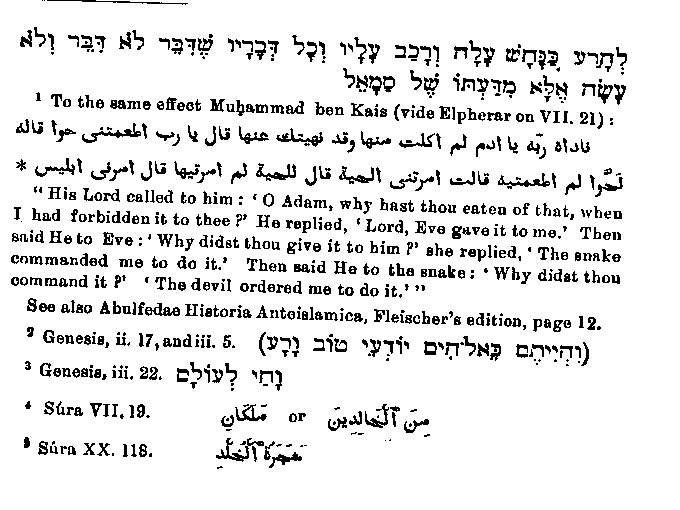
only one event in the life of Cain and Abel is depicted. This is depicted for us quite in its Jewish colours. In this passage, and indeed throughout the Quran, they are called sons of Adam, but in later Arabic writings1 their names are given as Qabil and Habil, which are clearly chosen out of love for the rhyming sounds. The one event mentioned is their sacrifice and the murder which it led to.2 Muhammad makes them hold a conversation before the murder, and one is likewise given in the Jerusalem Targum3 on the strength of the words in Genesis, "Cain said unto Abel his brother." Still, the matter of the conversation is given so differently in each case that we do not consider it worth while to compare the two passages more closely. After the murder, according to the Quran, God sent a raven which scratched the earth to shew Cain how to bury Abel. What is here attributed to Cain is ascribed by the Jews to his parents, and in a Rabbinical writing we find the following passage:4 "Adam and his companion sat weeping and mourning for him (Abel) and did not know what to do with him, as burial was unknown to them. Then came a raven, whose companion was dead, took its

body, scratched in the earth and hid it before their eyes; then said Adam, I shall do as this raven has done, and at once he took Abel's corpse, dug in the earth and hid it.1" In the Quran a verse follows I which, without knowledge of the source from which it has come, seems to stand in no connection with what has gone before, but which will be made clear by the following explanation. The verse according to my translation runs thus: "Wherefore we commanded the children of Israel, that he who slayeth a soul, without having slain a soul, or committed wicked-floss in the earth, shall be as if he had slain all mankind but he who saveth a soul live, shall be as if he had saved the lives of all mankind." One perceives here no connection at all, if one does not consider the following Hebrew passage:2 "We find it said in the case of Cain who murdered his brother: The voice of thy brother's bloods crieth.3 It is not said here blood in the singular, but bloods in the plural, i.e., his own blood and the blood of his seed. Man was created single in order to show that to him who kills a single individual, it shall be reckoned that he has slain the whole race; but to him who preserved the life of a single individual it is counted that he hath preserved the whole race." By this comparison it is made clear what led Muhammad to this general d igression; he had evidently received this rule from his informants when they related to him this particular event. Another
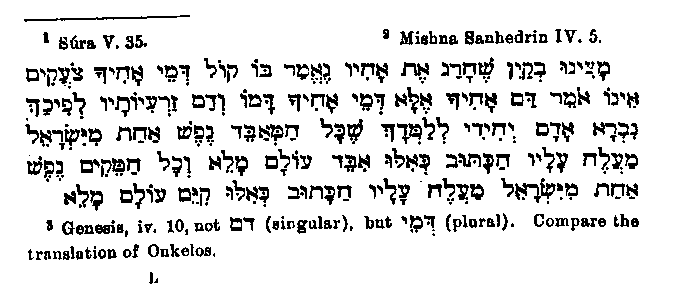
allusion to Cain is found in the Quran in a passage where he is called the man "who has seduced among men."1 No one else is mentioned in this period excepting Idris2 who, according to the commentators, is Enoch. This seems probable from the words,3 "And we uplifted him to a place on high," and also from a Jewish writing in which he is counted among the nine who went to Paradise alive. Jalalu'ddin brings this point even more prominently forward4 "He lived in Paradise where he had been brought after he had tasted death; he was quickened however, and departed not thence again." He appears to have gained his name5 on account of the knowledge of tbe Divine Law attributed to him. Elpherar remarks: "He was called Idris (searcher) on account of his earnest search in the revealed Scriptures." It is remarkable that in both these passages of the Quran6 he is mentioned after Ishmael.
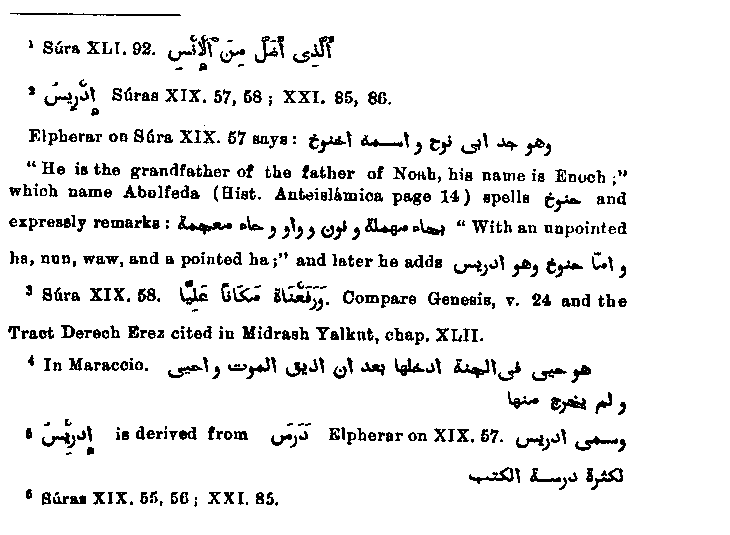
The corruption which spread in the time of Noah is not described with any details in the Quran, and one event which is stated by the Rabbis to have taken place at this period is transferred by Muhammad to Solomon's time, to which he considered it better suited, as it treats of angels and genii. The Rabbinical passage runs thus1 "Rabbi Joseph was asked by his scholars: 'What is Azael?' and he answered: when men at the time of the Flood practised idolatry, God was grieved at it, and two angels, Shamhazai and Azael, said to him 'Lord of the world, did

we not say unto Thee at the creation 'What is man that Thou art mindful of him ?'1 But He said: 'What shall become of the world ? ' They answered: 'We would have made use of it.' 'But it is well-known to Me that, if you lived on the earth, lust would overcome you, and you would become even worse than man.' 'Then give us permission to live with men, and Thou wilt see how we shall sanctify Thy name.' 'Go and live with them.' Then Shamhazai saw a maiden by name Istahar. He cast his eyes on her and said: 'Listen to me;' to which she replied: 'I will not listen to thee until thou - teachest me the explicit name of God, through the mention of which thou risest to heaven.' He taught her this name which she then uttered and rose unspotted to heaven. Then God said: 'Because she turned herself from sin, well I fasten her between the seven stars, that ye may enjoy her for ever'; and so she was fastened into the Pleiades. But they lived in immorality with the daughters of men, for these wore beautiful, and they could not tame their lusts. Then they took wives and begat sons, Hiwwa and Hiyya. Azael was master of the meritricious arts and trinket of women which beguile men to immoral thoughts." It is evident that this story is alluded to in the passage in the Quran,2 where the two angels Harut and Marut are said to have taught men a charm by which they might cause division between a man and his wife.3 During this state of
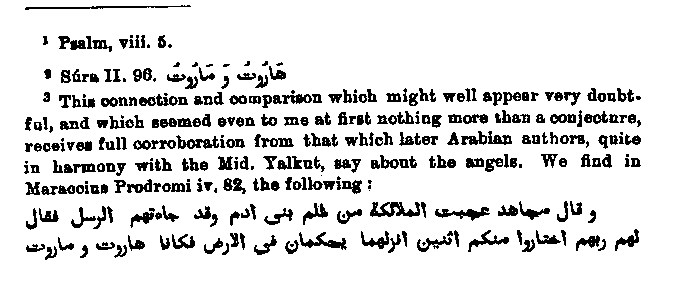
corruption of morals Noah appears, teaching men and seeking by exhortation to turn them from their evil ways. He builds himself the Ark and is saved, while the rest of the people perish.1 His whole appearance as an admonisher and seer is not Biblical but Rabbinical, and serves Muhammad's ends perfectly, as Noah in this way is a type of himself. According to rabbinical writings,2 Job, xii. 5 refers to Noah, "who rebuked thou, and spake to them words as severe as flames, but they scorned him and said "Old man, for what purpose is this ark ?' He, however, said: 'God is going to bring a flood upon you.'" Other particulars

also accord with Rabbinical tradition, e.g., "The people laughed at the ark,"1 accords with "They mocked and laughed at him in their words." "The waters of the Flood were hot,"2 with "The generation of the deluge was punished with hot water." Still many inaccuracies and perversions are to be found; for instance, Muhammad makes Noah to have lived 950 years before the Flood,3 whereas this is really the whole term of his life; and he represents one of Noah's sons as disobedient to him, and states that this same son did not follow him into the Ark, but believed himself safe on a mountain peak.4 This idea probably arose from a misunderstanding of Ham's evil conduct after the Deluge.5 Muhammad also makes out Noah's wife to have been unbelieving,6 although he is silent as to wherein her unbelief consisted, and I can find no reason for this statement, which is not mentioned either in the Bible or in the Rabbinical writings.
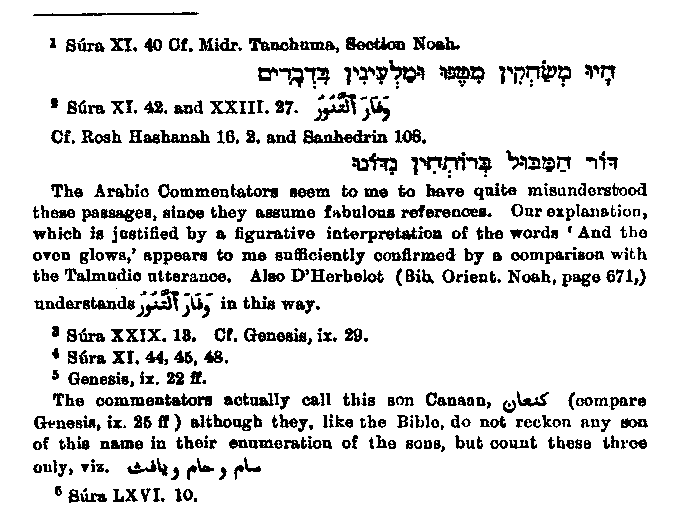
Perhaps Muhammad was misled by the analogy of the wife of Lot, who is mentioned in the same context. While these variations are fine to errors and to the confusion of different times and events, others are to be ascribed to deliberate1 alteration and elaboration. And of this kind are those details not mentioned in Jewish History, which represent Noah as one occupying the same position as Muhammad and speaking in his spirit. This applies particularly to that which is put into his month as admonisher. This is the case not only with Noah, but with all who appear in the character of the righteous in any evil age. Thus he puts into the mouth of Luqman, as a wise man known to the Arabs,2 words suitable to his own circumstances and opinions, and the same thing happens in the case of Noah and the other preachers of Jewish history to whom he alludes. Noah, though he worked no miracle, was saved in a miraculous way, and so Muhammad cannot put into his mouth the same words which he uses of himself, as well as ascribes to other forerunners of himself after Noah's time, viz., that he is a mere preacher; yet be makes him say everything which is not clearly contrary to the historical facts related about him. He was only an unimportant man,3 and did not pretend to be anyone wonderful or supernatural.4 But he was divinely commissioned to warn the people, and for this he asked no reward.5 O sancta simplicitas! one would exclaim in considering this last point, if Muhammad had written it down with fall consideration of Noah's position as one threatening the world with punishment, and if it had not been rather that he saw everything from his own distorted point of

view, and was determined to make every thing accord with his ideas. In another place he goes so far as to interpolate a verse into Noah's discourse, which is entirely characteristic of his own, and in which the little word (translated "speak")1 actually occurs, which is always regarded as a word of address to Muhammad from God (or Gabriel). The same thing will be noted further on in the case of Abraham.
After Noah the next mentioned is Hud2 who is evidently the Biblical Eber.3 This seems a striking example of the ignorance of Muhammad, or, as it appears to me more probable here, of the Jews round about him. According to the Rabbinical opinion4 the name Hebrew is derived from Eber, but in later times this name was almost entirely forgotten and the name Jew5 was commonly used. The Jews, to whom it was known that their name was derived from an ancestor, believed that the name in question was that in use at the time, and that the ancestor therefore was this patriarch Hud.6 His time is that in which a second punitive judgment from God on account of bold, insolent behaviour is mentioned in the Scripture,
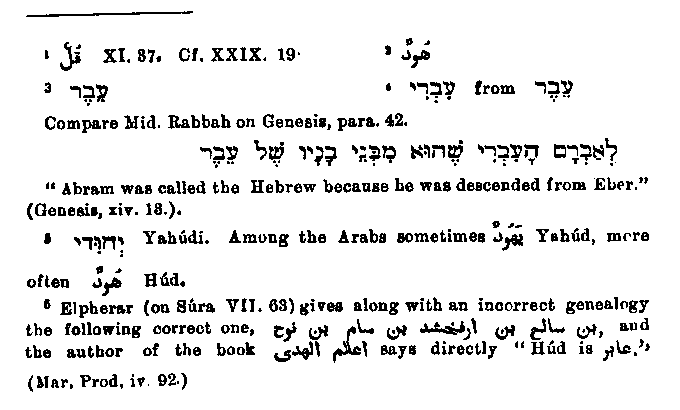
and this is treated of in several chapters of the Quran.1 In order to have the right to refer what is said about Hud to the time of the confusion of tongues, or, as the Rabbis call it, the Dispersion,2 we must adduce some particulars which point to this reference, for the statements are very general in their tenor and might be referred to ether occurrences. The following verse a possibly refers to the building of the Tower: "And ye erect magnificent works, hoping that ye may continue for ever." The Arabic commentators take it that the buildings would afford them a perpetual dwelling place, but the verse might also mean, "make by building it an everlasting name for yourselves." The neighbourhood is called in the Quran the "Possessor Of Pillars.4 In one passage5 there appears to be a reference to Nimrod, who lived at this time and in this region, since the children of Ad are here reproached for obeying the command of every contumacious hero.6 The idea that they were idolators, which is brought up against them in all the passages in the Quran, agrees perfectly with the Rabbinical view expressed as follows7 "And it came to

pass when they journeyed from the beginning (East), that is to say, when they withdrew themselves from Him Who is the beginning of the world." Muhammad says of these people1 that they built an (idolatrous) symbol on every high place in order to play there (i.e. to practice idolatry). And the Rabbis tell us2 that the race of the dispersion contemplated building a tower and putting an idol on its summit. Resemblances are also to be found with reference to the punishment which overtook them. Muhammad tells us3 they were followed in this world by a curse, and that they shall be followed by the same on the day of resurrection, and the Rabbis say4 that the race of the dispersion had no part in the next world, for the twice-mentioned dispersion applies to this world and the other. In Muhammad's treatment the essential point of the punishment is lost sight of, for instead of describing it as a simple dispersion and confusion of tongues, he speaks of an absolute annihilation of the sinners by a poisonous wind.5 One sees at once the mistaken source from which this change is derived. We recognize partly from our knowledge of Muhammad's motives in making the alteration, and partly from the minuteness with which

the new punishment is described, which would not have been accorded to a fiction. It appears therefore that the history reached this development in the mouth of the people, who delight in minute descriptions of punishment. The remaining deviations and additions, particularly the latter, are caused, as we have already remarked in the case of Noah, by confusion with Muhammad's own time and person. This is the case when he transfers unbelief in the resurrection to the time of Hud and counts it among the sins of that time which were worthy of punishment.1 This is seen too especially in the great importance assigned to Eber and to his desire to turn the people from their evil ways. Decided traces of this are certainly to be found in Jewish writings,2 where we are told that Eber was a great prophet, who by the Holy Spirit called his son Pelag, because in his days the earth was divided3 (which Eber had known beforehand). Much also is said of the school of Eber, and Rebekah is said to have gone there; for it is written: "She went to enquire of the Lord,"4 and Jacob is supposed to have stayed there for fourteen years. But of the fact that Eber preached to the people, he being their brother (on which Muhammad places great stress, because he himself was sent as an Arab to the Arabs), not a trace is to be found, still less of the fact that he took no reward from them.5 One point still remains to be cleared up, why the race under discussion is called in the

Quran the people of Ad1. The commentators state that Ad was the son of Uz, the son of Aram, the son of Shem, the son of Noah; and Muhammad seems also to have been of this opinion, whence it comes that he transfers the events to the land of Aram or Iram.2 Nevertheless it seems to have come about chiefly from the fact that all those occurrences are described with an Arabian colouring, and so they were attributed to Arab tribes, amongst which an ancient extinct one had the name of Ad3 perhaps in it there is also an etymological reference to a "return" to the early evil conduct of the generation of the Deluge. In another passage there is an allusion to this occurrence,4 where the fact itself is brought forward much more in accordance with the Biblical account, but quite without specification of time or persons: "Their predecessors devised plots heretofore, but God came into their building to overthrow it from the foundation, and the roof fell on them from above and a punishment came upon them which they did not expect." On this Elpherar remarks:5 "These are Nimrod, the son of Canaan, who built a tower in Babel in order that he might mount to heaven"; and further: "And when the tower fell the language of men became confused, and so they could not finish it; then they spoke seventy-three languages, on this account the city was called Babel (confusion), before this the language of men was Syriac." The Rabbis, too, assert that before this
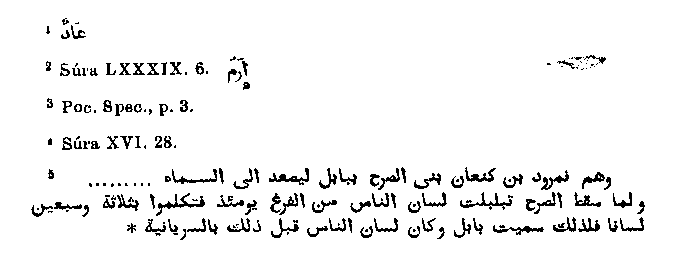
men spoke in Hebrew, but afterwards in seventy languages. Jalalu'd-din says the same thing,1 and adds that Nimrod built the Tower "in order that be might mount out of it into heaven to wage war with the inhabitants thereof."2 But the identity of this narrative with that of Hud and Ad is no more accepted by Abulfeda3 than it is by Elpherar and Jalalu'd-din, even on the view that Hud is the same as Eber. Although the colouring of this narrative as given in the Quran differs much from that of the Biblical account, yet the identity of the two can be shown by putting this and that together, and by explaining the way in which the individual differences arose. But in the case of another narrative which follows this one in almost all the passages of the Quran,4 it is very difficult to find out the subject of which it treats and the Bible characters to which it refers. This narrative is about Samud5 which like Ad is an ancient extinct Arab tribe,6 to whom their brother Salih was sent when they fell into sin. Salih is said to have exhorted the Samudites to righteousness and to have commended to them a certain she-camel as especially under divine protection;
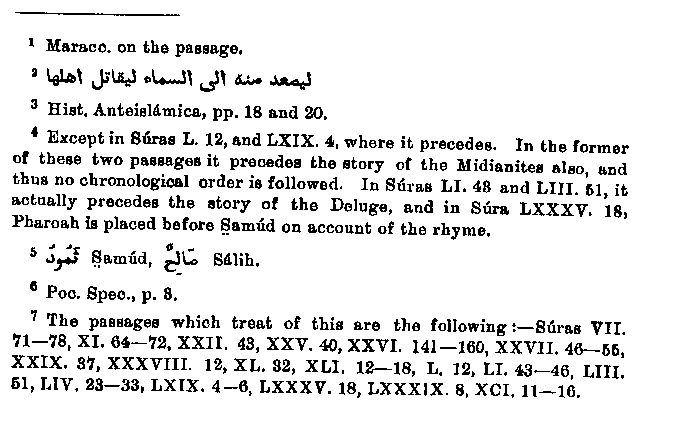
he even bade them share water with her.1 But the unbelievers of his time (according to one passage2 only nine in number) hamstrung her and so divine punishment overtook them. I find no similar occurrence in Jewish writings, but the likeness of the name points to Shelah3 who however, as the father of Eber, would have deserved mention before him.4 On the whole, the word is so general in its meaning of "a pious man" that we cannot treat it here with certainty as having been originally a proper name.5 Perhaps the story of the houghing is founded on the words in Jacob's blessing of his sons6, and the sharing of the water on the etymology of the name Samud.7 Moreover Sumud was, according to the commentators the son of Getter the son of Aram, the son of Shem, the son of Noah, which fits in fairly well with the date already assigned to Shelah.8 It is however impossible
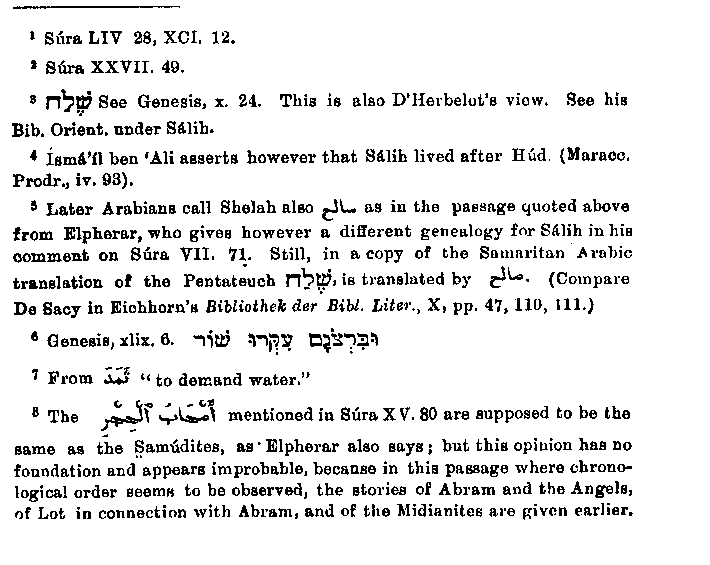
for me to give any more exact explanation from Jewish writings
Though the saints mentioned earlier bore some likeness to Muhammad, and though their condition, so similar to his own, encouraged him as well as verified his statements, yet Abraham was his great prototype, the man of whom like thought most history, and the one with whom he liked best to compare himself and to make out as one with himself in opinion. Abraham's faith2 is that which is preached in the Quran.3 He was a believer in the unity of God.4 He was neither Jew nor Christian for it is written:5 "Abraham was not a Jew, nor a Christian, but be was a believer in the unity of God, given up to God (a Muslim)."6
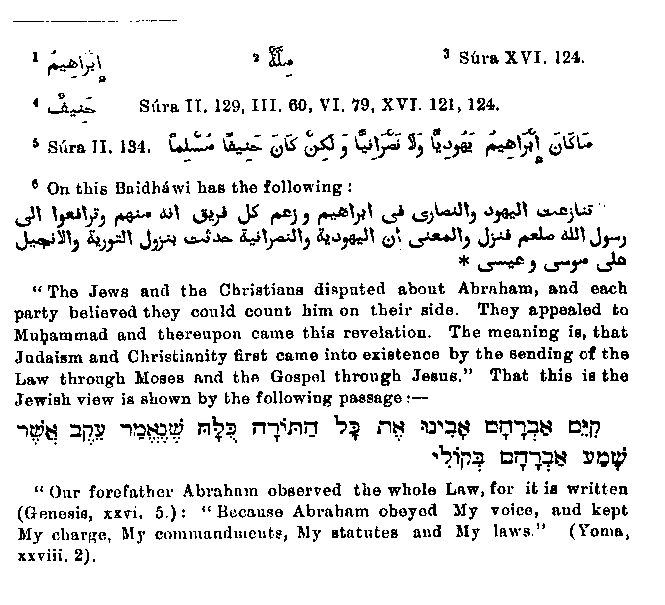
He is represented as the friend of God,1 and this is; his name throughout the East.2 Abraham's importance and the rich legendary material concerning him, which Judaism offered lead us to expect much about him in the Quran, and our expectation is not disappointed. It is to him that the founding of the Ka'bah is traced back.3 He is supposed to have lived in the Temple,4 and to have composed books.5 This opinion is also held by the Rabbis, many of whom attribute to Abraham the well-known cabalistic and undoubtedly very ancient Sepher Jazirah. Passing to the events of his life, we first come across the beautiful legend of his attaining to the true knowledge of God. "Ye are told also how he tried to persuade his father and his people thereto. A special instance of this when he destroyed the idols, and, putting the staff into hand of the largest, attributed the action to him. He sought thus to convince the people, who quite perceived the impossibility of the idols having done it, since they could not move, but they were not thereby persuaded.6 Abraham is represented as praying in vain that his father might be released from the punishment of hell.7 We are told too that the people, embittered by Abraham's conduct towards the idols, wanted to have him burnt alive, but that be was rescued from that fate by divine intervention.8 The whole story is taken from the Rabbinical writings, where we read as follows.9 "Terah was an idolator once

he went away and left Abraham to sell his idols. Whenever a buyer came, Abraham asked him his age. If he replied, I am fifty, or sixty years old, Abraham said 'Woe to the man of sixty who desires to worship the work of a day, so that the buyer went away ashamed.'1 Once a woman came, with a dish of wheat and said, 'Here, put this before them;' but Abraham took a stick and beat down all the
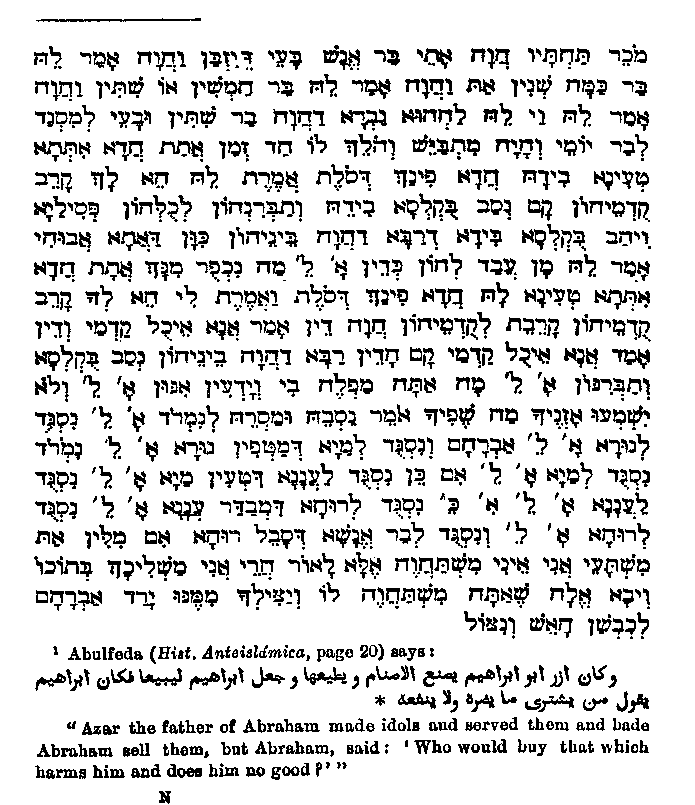
idols, and put the stick into the hands of the largest idol when his father returned, he said, 'Who has done this?' On which Abraham replied, 'Why should I deny it?, A woman came with a dish of wheat and bade me set it in front of them. I had scarcely done so when each wanted to eat before the other, and the greatest beat them all down with the stick which he had in his hand. Terah said: 'What art thou inventing for me? Have they then understanding?' Abraham replied, 'Do thine ears not hear what thy month says?' Then Terah took him and gave him over to Nimrod, who said: 'We will worship fire.' Abraham said: 'Rather water, which extinguishes.' Nimrod replied: 'Water then.' 'Rather the cloud which carries water.' 'The cloud then.' 'Rather the wind which scatters the cloud.' 'The wind then.' 'Rather men, who endure the wind.' Nimrod at this became angry and said: 'Thou art only making a speech. I worship fire and will throw thee into it. The God whom thou dost worship may come and save thee out of it.' Abraham was then thrown into a glowing furnace, but was saved from it." The intercession for his father is not mentioned in Jewish writings; and that this was fruitless, yea that Abraham, arriving at a clearer understanding, desisted from his attempt,1 seems to directly contradict the Jewish view as expressed in the following passage.2 "By the words, thou shalt go to thy fathers in peace, it was shown to Abraham that his father was a partaker in eternal life." Farther, a Rabbinical saying3 declares as a general rule that "the son makes the father clean, but not the father the son." But Muhammad very often combats

this view and the similar one that the merits of ancestors count for good to their posterity.1 For example he says "That people (the Patriarchs) are now passed away; they have what they gained and ye shall have what ye gain, and ye shall not be questioned concerning that which they have done."2 That Muhammad brings forward a dialogue between Abraham and the people, where the Midrash has one with his father only, is explained by the fact that Abraham is intended to be a type of Muhammad, and so it is necessary that he should be represented as a public preacher. Another circumstance which is mentioned in the Quran, is, that Lot became a believer with and through Abraham,3 may possibly have arisen from a passage in the Midrash immediately following that quoted above, which says that Haran the father of Lot was at first irresolute, but turned to Abraham's opinion after the deliverance of the latter. Haran however failed in the ordeal of fire to which he was then subjected. The idea of Lot's conversion, however, is chiefly derived from the account given of his subsequent life, in which he shows himself to be a pious man; and it is probably for this reason that Muhammad connects him with the event just related. Muhammad appears sometimes to have so confounded himself with Abraham that, in the middle of speeches ascribed to the latter, he indulges in digressions unsuitable to any but himself, and thus falls from the part of narrator into that of admonisher. In one passage4 a long description of Hell and Paradise is found, and in another,5 the declaration that those who came before had also been charged with imposture. No doubt Abraham might have said this with reference to Noah, Hud and Salih; still the words here seem rather forced into his speech, and indeed, in one verse we find the word 'say' which is to be regarded in the Quran as the standing

address of God (or Gabriel) to Muhammad.1 This view renders it unnecessary to adopt the desperate expedient of Wahl, who supposes a transposition of verses, or an interpolation. The true explanation is rather Muhammad's entire identification of Abraham with himself. Further, he is not content with making Abraham preach against idolatry, he represents him also as teaching the doctrine of the Resurrection of the dead.2 The lack however of full certainty abont this doctrine3 caused Abraham, according to the Muhammadan view, to pray for a tangible proof of it, and then was vouchsafed to him what the Rabbis called the "covenant between the divided pieces."5
He was convinced throngh the fact that the divided birds came together again and became living,6 a view which is foreign to Judaism. How Muhammad came to call Abraham's father, (whose name is given in the Bible as Terah7) Azar8 is at first sight not clear, but is completely explained when we consider the source9 of his information, namely Eusebius. In his Church History, Eusebius calls him Athar10 which is an easy transition from Thara,

and then the Greek Athar was easily converted into the Arabic Azar.1 The reason which is given by some Arabic commentators2 is ridiculous. They maintain that Azar is like Yaszar3 and that this means:4 "O, perverted one, O, erring one;" and Abraham is supposed to have thus addressed his idolatrous father.5 We now pass on to the more mature married life of Abraham and come to him meeting with the angels,6 whom he receives as guests.7 Abraham took them for Arabs, was much surprised that they did not eat and stepped back in fear, whereupon they announced to him that he would have a son and told him also of the coming destruction of Sodom. In one passage of the Talmud8 we read: "They appeared to him nothing else but Arabs;" and in another passage9 it is said
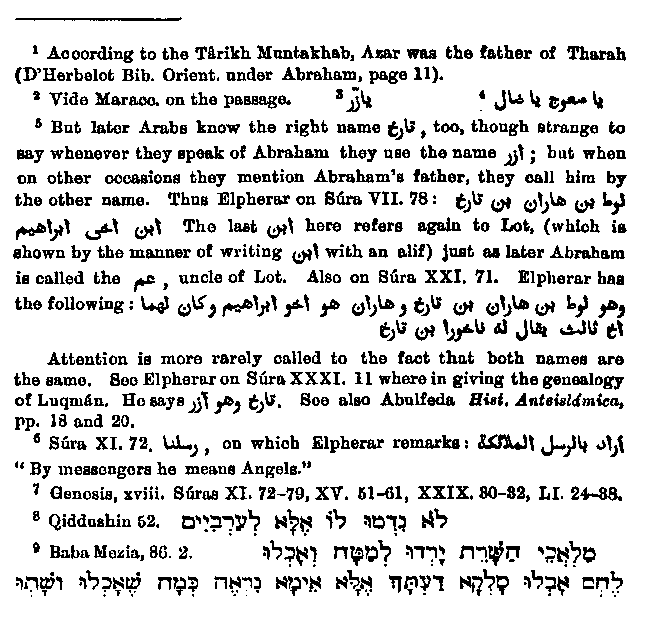
"The angels descended and ate. They ate? No, but it appeared as though they ate and drank." There is only one error to be found in the account as given in the Quran. The doubt as to whether in the advanced age of the pair a son could come into the world (which in other passages and in the Bible is put into the month of Sarah) is here uttered by Abraham, but in very mild words.1 It is true that in the other Biblical account of the promise to Abraham, he himself is represented as doubting God's word.2 In other passages the position of words and clauses might give rise to many errors, if we did not know the story better beforehand from the Bible. Thus in one passage3 the laughter of Abraham's wife is given before the announcement is made, which leads the Arabic commentators to manifold absurd guesses. Elpherar by the side of these explanations (many of them quite wanting in truth) gives the right one in the following words:4 "Bin 'Abbas and Wahib say: 'she laughed from astonishment that she should have a child, for both she and her husband were of a great age. Then the verse was transposed, but it ought to run thus: 'And his wife stood while We promised him Isaac, and after Isaac, Jacob, and then she laughed.'" It might seem that this son who was promised to Abraham was with deliberate forgery identified with Ishmael, because he is regarded as the ancestor of the Arabs; and so too the ensuing temptation5 connected with the sacrifice of his son is made to refer to Ishmael.
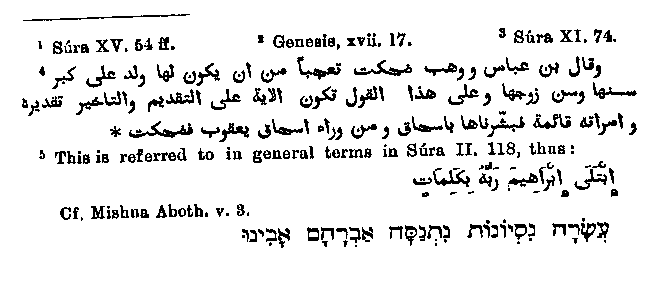
Ground for this acceptation is given in another passage,1 when after the dispute about the idols has been related, we read from v.99 as follows: "Wherefore We acquainted him that he should have a son who should be a meek youth, and when he had attained to years of discretion Abraham said unto him: 'O, my son! I saw in a dream that I should offer thee in sacrifice.'" He declared himself ready, on which Abraham heard a voice telling him that he had already verified the vision; and a noble victim ransomed him. And then the passage continues2 "And We rejoiced him with the promise of Isaac, a righteous prophet; and We blessed him and Isaac; and of their offspring were some righteous doers, and others who manifestly injured their own souls." That the announcement of Isaac first appears here is a proof that the preceding context3, refers to Ishmael. It is therefore evident that according to Muhammad's representation the sacrificial action was performed on Ishmael, and further on this will be shown more in detail. But it is not clear that the announcement of the angels refers to him, seeing that in one of the three places where the same word4 is used of this angelic announcement, it is explicitly applied to Isaac. That the angels had a two-fold mission - (1) to Abraham, in order to show him his fatherhood and the destruction of Sodom, and (2) to Lot, in order to remove him from Sodom before the destruction was accomplished, is Biblical and Muhammad follows the Bible narrative. We have already mentioned that Lot is supposed to have

become a believer through Abraham. The visitation of the angels, which is related in Genesis, xix. 1-27, is mentioned in several passages in the Quran.1 On the whole the narrative is fairly true, but the details are not entirely free from embellishment. For example, in some passages2 the warning addressed to the people of Sodom on account of their unchaste use of men is treated quite separately from the narrative of the angels, and Muhammad makes out that the angels told Lot3 and even Abraham4 beforehand that Lot's wife should not be saved. The unbelief of Lot's wife receives particular notice in one passage,5 while the destruction of the cities is mentioned in many passages.6 Muhammad especially attributes to Lot the distinguishing mark common to all preachers, viz., that they ask for no reward.7
It has already been remarked that, according to Muhammadís showing, Ishmael* was the son whom Abraham was
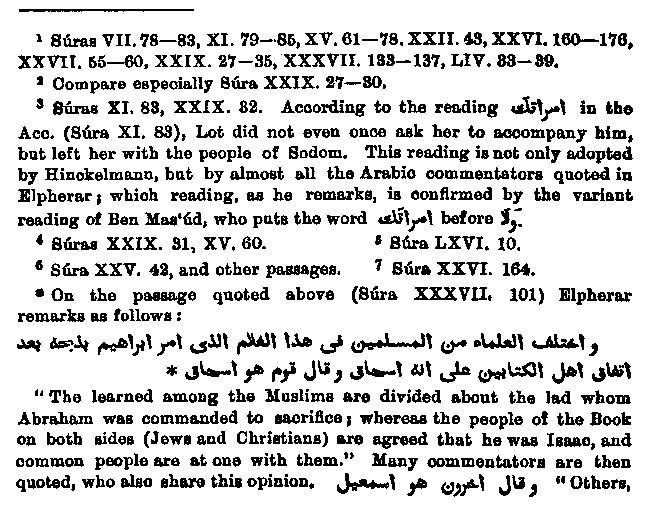
commanded to sacrifices , and the reasons have been given which persuaded Muhammad to represent Ishmael as a
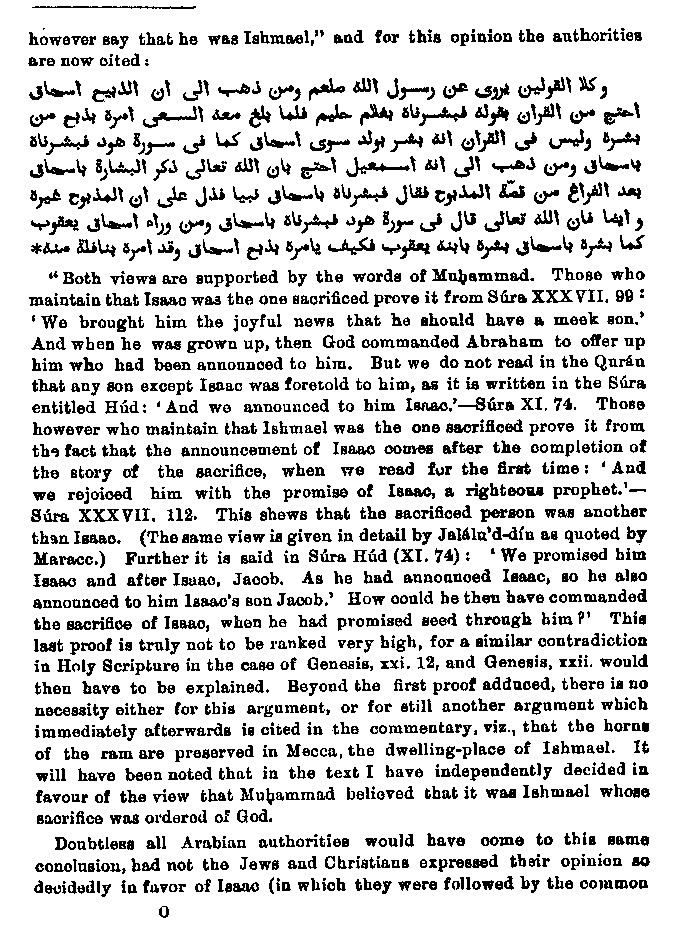
very righteous man,1 to include him in the ranks of the patriarchs and prophets,2 to mention him as the righteous son of Abraham,3 and to make out that he laid the foundation stone of the Ka'bah in connection with his father.4
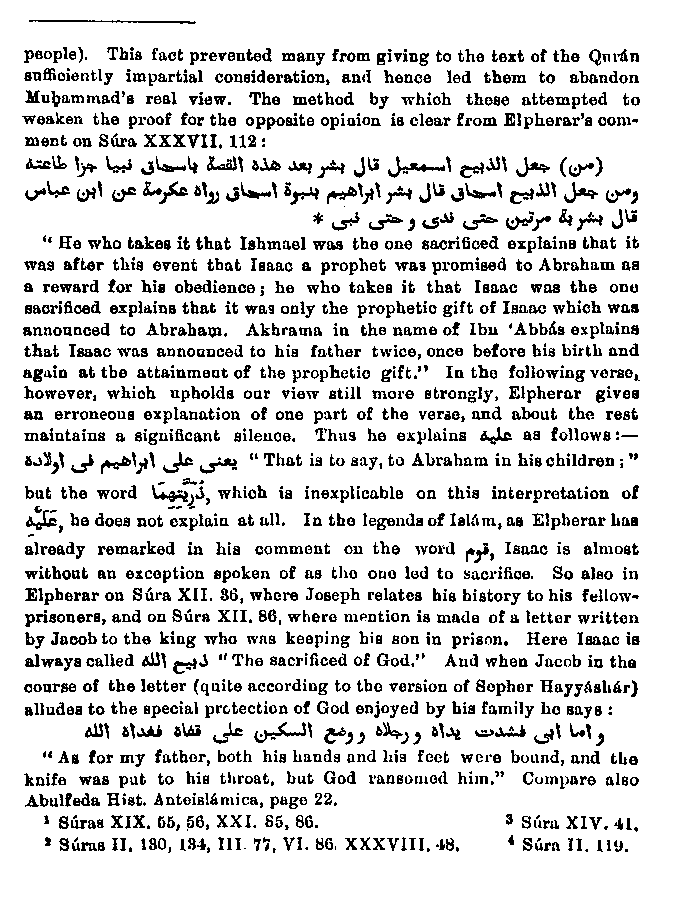
This view is certainly not Jewish, but at the same time it is not contrary to Judaism, for the Rabbis tell us1 that by the utterance "Thou shalt be buried in a good old age (Genesis, xv. 15.) God showed Abraham that Ishmael would repent." And in the Talmud it is said2 that Ishmael repented during his father's life-time. From his habit of reckoning Ishmael among the patriarchs, Muhammad fell into the error of counting him as an ancestor of Jacob. Thus in one passage3 he says: "The God of thy fathers, Abraham and Ishmael and Isaac," which Baidhawi attempts to explain in the following manner;4 "He counts Ishmael among his ancestors, connecting him with the father - the grand-father also is the same as the father - and as Muhammad says, The uncle is a part of the father. Then pointing to 'Abbas, his uncle, he said, This is the survivor of my forefathers."
As he hereby transfers to Ishmael the action, which as the most worthy, is attributed by the Jews to Isaac, viz., readiness to be sacrificed, the latter remains simply a pious man, about whom there is little to relate and who is quite destitute of all legendary adornment. In consequence of this, Isaac appears only in the lists of the patriarchs, and almost always in those passages where Abraham's deliverance from the fire is mentioned and also his reward for his piety. In these passages Muhammad following more the popular tradition mentions Isaac and Jacob but not Ishmael.

We are now struck by the strange confusion which seems to have existed in Muhammad's mind about Jacob.1 He seems to have been uncertain whether he was Abraham's son, or his grandson, the son of Isaac. While there is no passage which says explicitly that he was Abraham's son, yet this idea is conveyed to all who have not learned differently from the Biblical history. In the angel's announcement2 it is said, "after Isaac, Jacob;3 and in other passages4 we read: "We gave to him (i.e. to Abraham) Isaac and Jacob. In the Sunna, however, Joseph is called clearly the grandson and Jacob the son of Abraham.5 Although these passages do not prove the point absolutely, yet those passages which can be brought forward in support of the opposite view are much less powerful. For if it must be allowed that in two passages6 Abraham and Isaac, and in one of these Jacob also, are mentioned as the forefathers of Joseph we can also shew another passage where Ishmael is mentioned as a forefather of Jacob without any continuous genealogy having been given. And farther, since in the passage last cited Abraham, Ishmael and Isaac are counted as the fathers of Jacob, it is clear from the mention of Ishmael among the others how great was the confusion which reigned in Muhammad's mind about Jacob's parentage.
We by no means assert that Muhammad took Jacob for the son of Abraham, but it is evident that the relationship
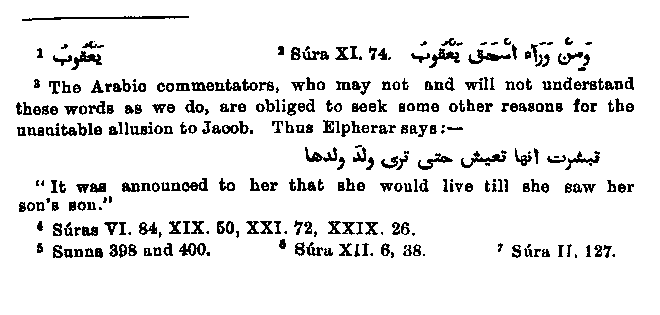
between the two was not clear to him. This error did not spread; on the contrary, the later Arabs were better acquainted with these relationships. Thus, e.g., Zamakhshari1 says: "It is related of the prophet that he said, If you are asked, who is the noble one?' answer: 'The noble one, the son of the noble one, the son of the noble one, the son of the noble one is Joseph, the son of Jacob, the son of Isaac, the son of Abraham.'"2 But this is no testimony to the fall certainty of Muhammad himself, for often the traditions spread among the later Arabs are more correct than those given in the Quran, as we said before in the case of the sacrifice of Isaac. Only a little is given of Jacob's life. There is an allusion to his wrestling with the Angel in the following words3 "All food was allowed to the children of Israel before the revelation of the Law, except what Israel (as he is here called)4 forbade himself." This is evidently an allusion to the Biblical passage where the prohibition against eating the sinew of the thigh5 is mentioned,6 which Baidhawi7 also gives, but assigns a wrong reason for it. Beyond this allusion and the history of Joseph, in which he is also involved and which we will give later on, the only other thing told about Jacob is his admonition before his death. This is

given in accordance with rabbinical sources follows1 "And Abraham commanded this to his sons,2 even to Jacob: 'My children, verily God hath chosen this religion for you, therefore die not unless ye also be resigned.' Were ye present when Jacob was at the point of death? When he said to his sons, 'Whom will ye worship after me?' they answered: 'We will worship thy God and the God of thy fathers Abraham and Ishmael and Isaac, one God, and to him will we be resigned.'" We find something similar in the Rabbinical writings:3 "At the time when Jacob was leaving the world, he called his twelve sons and said to them: 'Hear your father Israel,4 is there any doubt in your hearts about God?' they said: 'Hear Israel our father, as in thy heart there is no doubt about God, so also there is in ours; but the Lord is our God, the Lord is one.'5 Then he spoke out and said: 'Praised be the name of his glorious kingdom, for ever.'"6 The sons of Jacob are not individually mentioned, but they appear in the list of the Patriarchs as "the tribes,"7 so called because of the subsequent division into tribes; Joseph8 alone enjoying an honorable exception.

being alluded to in one other passage,1 Joseph forms the theme of almost the whole of the twelfth Sura,2 which is named after him. This Sura contains the narrative given us in Genesis,3 with many abbreviations it is true, but also with many additions and alterations, which must be pointed out. We must first mention the additions which are derived from Jewish legend. Among these is the statement that Joseph was inclined towards Potiphar's wife, but that a sign warned him from her.4 The Rabbinical comment on the words "He went into the house to do his work"5 runs as follows:6 "Both intended to commit sin;" and on the words "She caught him by his garment saying, 'Lie with me,'" Rabbi Yohanan remarks, "Both had got on to the bed, when the form of his father appeared to Joseph at the window and said: "Joseph, Joseph, one day the names of thy brethren will be graven on the stones of the Ephod, also thine; wilt thou that it shall be effaced?"7 The fable that the Egyptian women
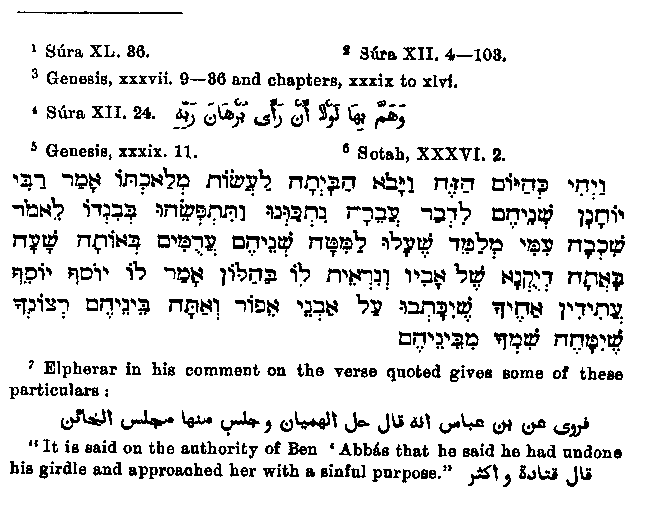
mocked at Potiphar's wife, were invited in by her, and in contemplating Joseph's beauty1 were so absorbed that they cut their own hands, is found in an old Jewish writing2 which, though not genuine, is certainly very ancient, and is written in very pure Hebrew. This work is sometimes referred to in the Midrash Yalkut under the name of "The Great Chronicle."3 In an old Jewish German translation however, it bears another title.4 It is this translation which I have before me as I write, and for this reason I will not quote the actual words.5 Also the discussion about the
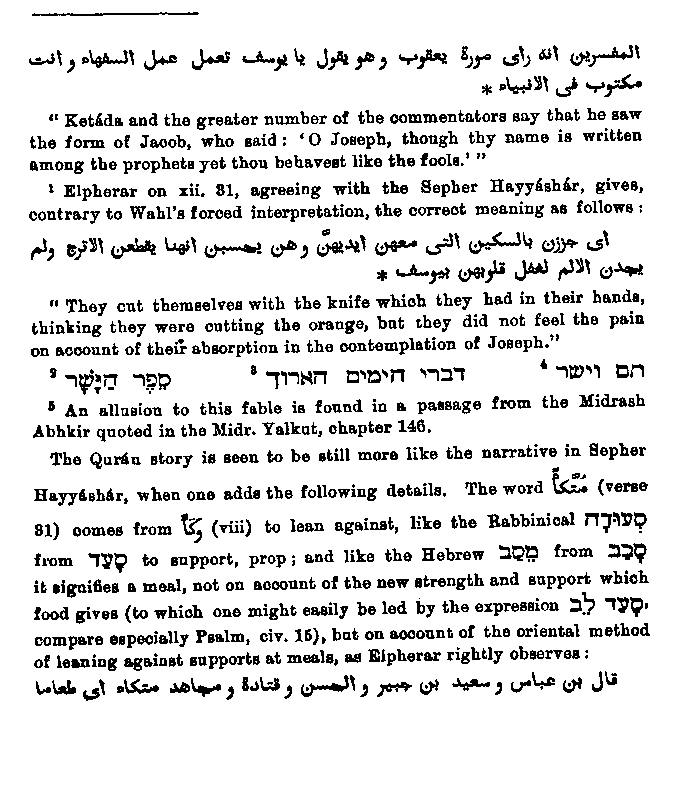
tearing of the clothes, whether they were torn in front or at the back1 is found in the same way in the Sepher Hayyashar. In the words, "and a witness bore witness,"2 which we here do not take strictly according to the meaning of the context, but rather in the sense of an "arbitrator decided,"3 others see an allusion to a witness
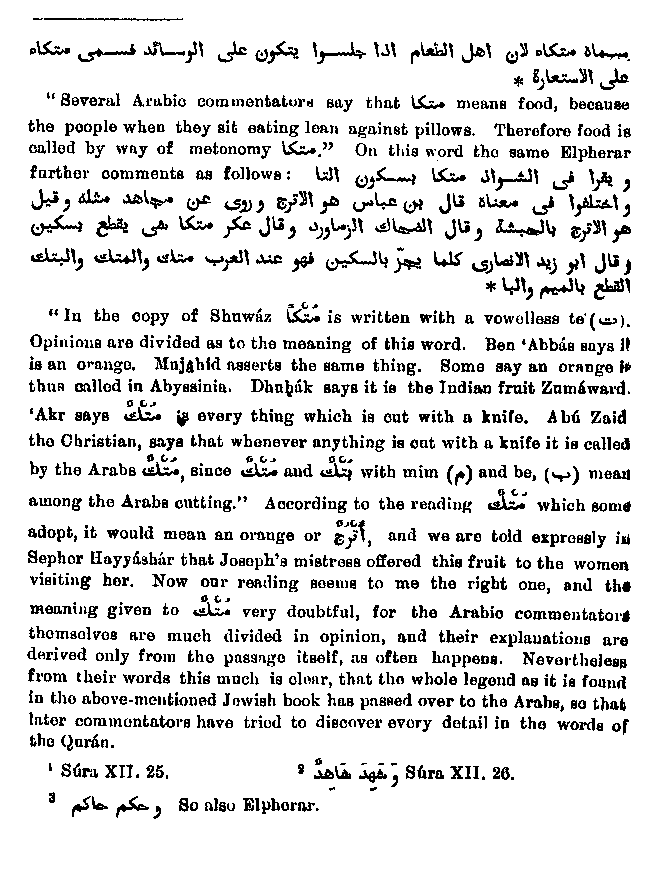
who was present at what occurred between Joseph and the woman, and some of the commentators quoted in Elpherar express themselves quite in harmony with the Sepher Hayyashar as follows:1 "Sa'id Ben Jabair and Dhubak say it was a child in the cradle which God permitted to speak. This is the tradition of the Uphite commentator according to 'Abba's." In the Sepher Hayyasbar it is also asserted that there was present a child of eleven months who till then could not talk, but then attained to speech. But there is a difference in that the Jewish book makes the child confirm the utterance of Joseph, while the Arabic commentator puts into its mouth the decision about the rent clothing, while other Arabic writers reject as highly unsuitable. Many commentators say that this was no child,2 but rather a wise man full of penetration. It follows from this that Muhammad either mired the two legends inappropriately, or else that the second one came later into Arabic tradition and was read by the Arabs into the words of the Quran. The words3 which Wahl translates: "But the devil would not allow it4 that he (the cap-bearer) thought of him (Joseph)," are explained by the following passage:5 "The talk of the lips tendeth only to penury,6 because although Joseph reminded the
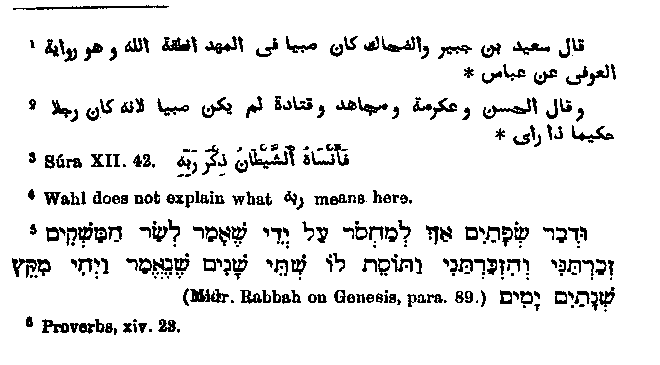
cup-bearer twice1 that he should remember him, yet he hail to remain two more years in prison; for it is written, 'And it was after two years.'"2 The seeking of protection from the butler is here regarded as sinful, and therefore Muhammad says: "And Satan made him (Joseph) forget the remembrance of his Lord (God)," in that he trusted not in God but in man.3 In the same Sura,4 Jacob recommends his sons to enter by different gates in like manner we read in the Rabbinical writings5 that Jacob said to them: "Do not enter by the same door."6 The statement7 that the brothers said, when they found the cup in Benjamin's sack: "If he be guilty of theft his brother hath also been guilty," is evidently an erroneous change in the words of a passage found in the Midrash quoted above,8 according to which they said, "See a
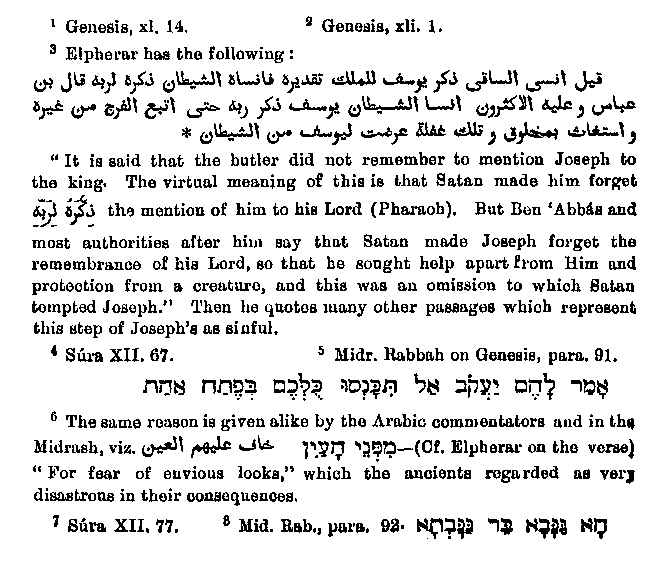
thief, son of a thief," with reference to Rachel's having stolen the Teraphim.1 From the Quran it appears2 that Jacob knew by divine communication that Joseph still lived, which is opposed to one Jewish view3 but agrees with another,4 which runs as follows: "An unbeliever asked our teacher 'Do the dead live on? Your fathers did not accept this, and will you accept it? It is said of Jacob, that he refused to be comforted.5 If he had believed that the dead live on, would he have refused comfort?' Then he answered him. 'Foolish one he knew through the Holy Ghost that he still lived (in the flesh), and one does not take comfort concerning the living.'" The story that Joseph told Benjamin beforehand who he was, is common to the Quran6 and the Sepher Hayyashar. Besides those additions from Jewish legends there is also other matter which owes its origin to error, or possibly to traditions unknown to us. Muhammad's statement7 that the brothers asked their father to send Joseph with then, contradicts the Biblical account;8 and the statement that one of the

Ishmaelites who went to draw water found Joseph in the pit is against the clear word of the Scripture that the pit was dry.1 Muhammad makes Joseph expound Pharaoh's dream and only afterwards does he have him fetched from prison,2 in contradiction to the Bible narrative.3 He asserts that Jacob became blind from grief, but that he recovered his sight by the application of a shirt to his eyes. He was perhaps thinking of Jacob's loss of sight4 later on, or possibly the idea is based on some legend unknown to me. According to the Quran Joseph's parents5 came to him in Egypt, in spite of the fact that according to the testimony of the Scriptures6 Rachel was long since dead. Muhammad's idea probably was to bring about a complete fulfilment of the dream, which mentions both parents.7
On this, however, some of the Rabbis remark that this is a sign that no dream is without a mingling of some vain matter, while others say that Bilhah, Joseph's subsequent foster mother, is alluded to. Something like this is quoted by Zamakhshari, to the effect that "this meaning his father and his aunt;"8 while Elpherar has9 still more clearly: "Katada and Sada say that by the moon is meant his aunt because his mother Rachel was already dead." Thus it is possible that Muhammad means this aunt here, even as Elpherar remarks on another

passage,1 to wit, that "Most commentators say that by these are meant his father and his aunt Leah, his mother having died at the birth of Benjamin." It is quite in accordance with Muhammad's usual procedure to put into Joseph's mouth a long discourse on the unity of God and the doctrine of a future life. This is given before tho interpretation of the dreams of his two fellow prisoners.2 With Joseph we finish the first period, for between Joseph and Moses Muhammad mentionss no one else. It almost seems as if, with Justin, Muhammad regarded Moses as Joseph's son, although of course we cannot seriously attribute such an opinion to him.
